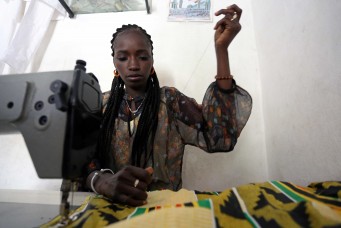From Ideas to Policy: Q&A with Ibrahim Awad
Is it possible to imagine, let alone move toward a different global political-economic order? Ibrahim Awad believes conferences and the exchange of ideas have a role to play in moving such a reality forward

A woman buys traditional handmade sweets at a street market ahead of Mawlid al-Nabi, the birthday of Prophet Mohammad, in Sayeda Zainab neighbourhood in Cairo, Egypt, as sellers and customers all say prices of raw materials have increased due to the currency crisis, leading to a decrease in demand, September 24, 2023. REUTERS/Mohamed Abd El Ghany
Awad has, for decades, served as a thought leader and practitioner on issues of labor, migration, development and political economy, and international relations. A professor of practice at the American University in Cairo and director of its Center for Migration and Refugee Studies, he is also currently the co-principal investigator for the Pathways Beyond Neoliberalism: Voices from MENA project.
The project has been active this year, launching its podcast in March 2024, hosting a summer school on economic journalism in June, and organizing the Political Economy of the Global South conference in September.
The conference brought together scholars from around the world to discuss a variety of pertinent issues. Anchored on an imaginative Global South perspective, sessions included panels and talks ranging from industrial policy to democratic backrolling, including discussions on reimagining a new economic order, post-colonialism, and global governance and cooperatives in the Middle East.
On the sidelines of the conference, the Cairo Review’s Omar Auf sat down with Awad to discuss the questions of labor, development, and reimagination.
What does it mean to host the first conference on the political economy of the global south?
IA: This is indeed the first conference ever on the political economy of the Global South. The scholars, researchers, and authors who are interested in political economy—which, in simple terms, is the interaction of politics and economics and the outcomes of these interactions—have never come together. I mean by this the scholars from the Global South, from Africa, the different regions of Africa including North Africa, from Asia, from Latin America, they have never come together to discuss what are the common issues that they confront, what are the different issues in each region, what are the commonalities between them.
Why do we say the Global South? Because the Global South is made up of regions of the world that are in a dependent relationship with the core of the world, with the most advanced industrialized countries in the world. And they are in dependent positions in the structure of the global economy, but of course in different locations. But they share the [fact of] dependence. A good part of the value added produced by their economies is drawn up by the Global North, all economies being interlinked in a global economy.
Now if you look at the structure of the conference, many subjects could have been discussed, but the deliberations between different universities involved in the larger project, which is about finding alternatives to neoliberal economic and social policies, have resulted in a certain structure of the conference and in this structure you find, for instance, issues of industrial policy. The assumption being that in order to develop you need to have purposive industrial policies, a purposive set of measures meant to grow both in quantity and in quality in a certain area.
Industrial policy is not necessarily about manufacturing industry; services could also be subjects of industrial policies. So the idea of overcoming underdevelopment needs industrial policy. In fact, even industrialized countries are now embarked on industrial policies, a term and a concept which was derided, looked down upon for several decades, but which has regained respectability, if you wish, between inverted commas, since the global financial crisis.
You have questions related to colonialism and the relationship between colonialism and capitalism and what you can expect in a post-colonial world. Prominently, you have the question of the democratic backrolling under neoliberalism and this we witness not only in the developing world, but even in the industrialized world. And then, of course, you have the question of informality.
The economies of the Global South are to a large extent informal, but the degree of informality varies. And let me also add that we do not have a cut-off line between the industrialized world and the developing world. We have informality in the industrialized world to different degrees.
You have informality in Greece, you have informality in Italy. But the Global South is characterized by a large informality. Here we are concerned with the economies, but you have informality in different segments of social life.
We are discussing questions surrounding informal economies. The economies in the Global South in developing countries are largely informal, like in Egypt or Morocco. In India, ninety percent of employment is informal. Even in relatively developed countries in the Global South, like Argentina, their informal economy is quite large.
This is also what this conference explores. For instance, we just had a session where one of our Mexican colleagues explained certain aspects of informality in the Mexican economy that are also seen in Egypt. There are commonalities. Maybe if we put our heads together, this can advance us in dealing with the challenges of informal economies.
We look at the conditions of work. Conditions of work in the Global South are, of course, unfavorable. Unfavorable for human development or for development. Let’s say that conditions of work are reflective of lack of development and their improvement is conditioned on advancing towards development.
Talking about informality leads us to discussing social protection. We have in the Global South human beings, workers, who spend their lives working without social protection. So the moment they cannot work, they don’t have income with which to meet their needs, because they don’t have social protection.
It is thus clear that terms and conditions of employment are of great significance when employment is discussed. Class, race, inequality are other important questions dealt with by the conference. Our colleagues will have agreements and disagreements on the topics discussed. What is important is to have a space for discussions. This is a step in a process which hopefully will take us forward and will lead us to a fairer global economy in a more just world.
How does holding a conference like this one work toward re-imagining and pursuing a different international economic order?
IA: I think that no conference or event alone can achieve a desired outcome. A conference is one step in what will be analyzed, many years in the future, as a process. This is the process of thinking about development in the Global South.
This process started with the Economic Commission of Latin America (ECLA), starting all the way back in the late 1940s, through the very important conference on the Problems of Economic Development held here in Cairo in 1962. People mention [the 1962 Cairo conference] only briefly, but it was foundational for what came later. So I think a conference like this, raising these topics, brings people together. People network and debate among themselves. Not everyone will be convinced on every argument their colleagues make, but some will be. Some will be eighty percent convinced, some will be sixty percent convinced, and things will go forward.
As someone who has worked extensively on issues of labor, both in academic and policy spheres, what role do you think labor has as a factor of production that should be included in a new economic order?
IA: Without labor there is nothing. There is no production without labor. So you may have capital, but capital without labor takes you nowhere.
But now the question is, how do we represent labor? How will workers be represented? During this conference we have talked about the development of international or global civil society and non-state actors. Labor movements have been a major actor in society when it comes to the issue of work and employment. The International Labour Organization, for instance, is the only organization in the United Nations system where labor is represented, along with business, or employers, and naturally governments.
When it comes to labour, it can be noticed that a combination of factors, including the effects of neoliberalism, the rise of new technologies, and demographic transitions have resulted in shrinking labor forces in manufacturing. The labor unions I mentioned earlier were built for the manufacturing industry. We used to have lines of production, hundreds of workers; when they picketed, they had influence. Now, this concentration of workers no longer exists. We have a fragmented labor force. In addition, we are seeing the transition from manufacturing to service industries, especially in economically developed countries, which further impedes the influence of labor unions. Some places, like Germany, still have strong manufacturing sectors. But the UK, which used to have the most famous labor movement in the world, is changing to the service industry and losing that movement.
What effect does this diffusion of the labor force have on developing countries?
The informal economies lack a concentration of workers. In the Global South, over ninety% of enterprises are small and micro enterprises. This means the workers don’t have strong representative organizations, which affects their bargaining power with employers.
You had mentioned informality in industrialized countries like Italy and Greece. I was wondering how migration intersects with informality in these countries and what are the dynamics between them?
Migration connects economies and migration makes national economies a global economy. In the industrialized world, you have drivers of migration. You have shrinking populations and labor forces. So in order for the economies to function, you need workers. The workers are also needed in order to sustain social protection systems. Because those who work now support those who have stopped working. This is the pay-as-you-go social security system.
Workers are also needed in countries with small populations like in member states of the Gulf Cooperation Council (GCC). The resources that a country may have need to be used, which requires labor, i.e. workers. This a driver of migration. In addition, of course, there are the drivers of migration in the countries of origin. There are essentially the questions of deficient terms and conditions of employment that we have discused. You work 10 hours, 12 hours. You don’t have paid annual leave. If you have a work accident, you don’t have an income any longer.
All of this also drives people to migrate, not only nor chiefly their unemployment. As for irregular migration, it is associated with informality. Everyone wishes for legal migration to meet demand for labor. The economy of a country X may need 1,000 workers. But this country may formally demand 600 only. If this country has an informal economy, it will attract irregular migration. In the informal economies, workers don’t need work permits. So in fact, by not recognizing labor demand in their economies, countries may end up bringing in migrants in irregular situations. The informal economies are at the origin of irregular migration. Which is a fact that is very often overlooked and not given the importance it deserves.
And by the way, let me add that the informal economies are not created by migration. Informal economies exist. Migrants come to meet the demand for labor. But informality exists well before migration became a social phenomenon of importance. This is the case of Italy, for example.
How has migration been affected by neoliberal governance, and how can that change?
IA: One thing that can be said is that the liberal order resulted in countries of the Global South specializing in low value-added production. In the MENA region, this has caused there to be a low level of demand for skills; there is no need for highly skilled workers to engage in the type of low value added, low knowledge-content production being done in MENA. As a result, you have high rates of unemployment among the highly educated. Holders of master’s degrees or PhDs in science disciplines unable to find employment in their countries may migrate. For the highly-educated who are employed, the deficient terms and conditions of their employment may drive them to migrate.
Take the example of young medical doctors who, because of low pay, will combine two jobs, one in a public hospital and another in a private one, in order to raise their incomes. This means that these doctors are exhausted.
Meanwhile, industrialized countries have a high demand for medical doctors because they suffer from an aging population and a low entry into their labor forces. These countries’ education systems cannot keep up producing the doctors they need. Doctors from developing countries move to industrialized countries to close the gaps in their needs. The result is a deficit in meeting demand for medical services in developing countries. This applies in the MENA region and beyond. It happens in Tunisia, but also in Ghana, the Philippines and India.
So this is the link between the neoliberal economic order and the issues we are seeing in developing countries. Some analysts, though, will point more toward policy problems at a national scale, rather than pointing to problems with the global system. It is a difference in levels of analysis, either systemic or at the level of the country.
How do we take the fact that many developing countries are suffering from this migration problem and turn it into something that is policy in a way that can be used by policymakers?
IA: Discussions now are being framed as brain drain, brain gain, brain waste. I think that the three exist. But developing countries of the Global South cannot ignore brain drain, which, by the way, is also experienced in some countries of the Global North.
In countries of the Global South with still high growth rates of population of labor force, education and training systems can be developed so as to produce highly skilled workers, medical doctors, and engineers, in sufficient numbers to meet domestic demand as well as external demand in the industrialized world.
This would need a large transfer of resources, not only of financial resources, but also of technical resources. Migration and development policies should be coordinated. Developing countries can take advantage of the international demand for skilled labor to improve their bargaining position on issues of migration with their industrialized counterparts. Migration negotiations would thus move beyond irregular migration and smuggling to encompass questions of highly-skilled migration. .




